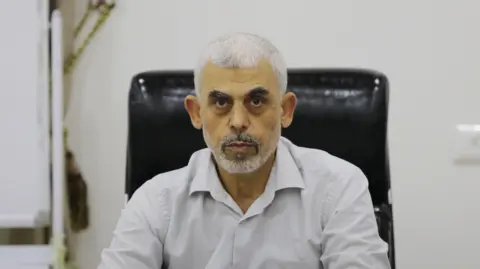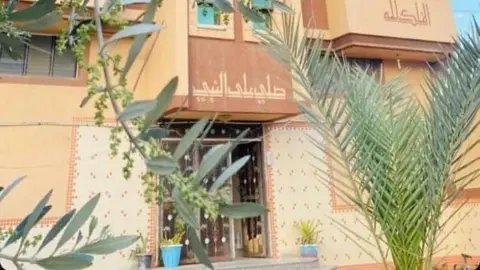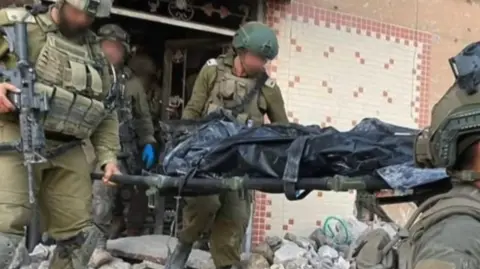 Getty Images
Getty ImagesA displaced Palestinian from Gaza has told the BBC that the house the former Hamas leader was killed in was his home for 15 years before he had to flee in May.
Ashraf Abo Taha said he was “shocked” as he identified the partially destroyed building in Israeli drone footage of the incident as his home on Ibn Sena street in Rafah, southern Gaza.
Yahya Sinwar, the key figure behind the 7 October attacks on Israel, was killed by Israeli troops on Wednesday.
The Israeli military released drone footage that it said showed Sinwar in a partially destroyed house before he was killed.
Mr Abo Taha told BBC Arabic’s Gaza Lifeline that he had left his home in Rafah for Khan Younis on 6 May, when Israel ordered evacuations and began an operation against Hamas fighters, and had not received any news of his house until now.
Mr Abo Taha said his daughter first showed him the footage purportedly capturing Sinwar’s last moments on social media, saying it depicted their house in Rafah. He initially didn’t believe her, he said, until his brother confirmed the house was indeed his.
“I was like ‘yes this is my house’ and I saw the pictures and here I was shocked”, Mr Abo Taha said.
He said he had no idea why Sinwar was there or how he got there.
“Never ever did me and my brothers and sons have anything to do with this,” he said.
The BBC has verified that pictures and videos provided by Mr Abo Taha of his home match imagery of the house where Sinwar was killed.
BBC Verify compared and matched images of the home’s window archways, external decorations on doorways, shelves, and armchairs from the footage.
The BBC cannot independently verify that Mr Abo Taha owned the home.
 Ashraf Abo Taha
Ashraf Abo Taha IDF
IDFThe footage of Sinwar’s killing was analysed by the BBC, and the house in which he was last seen was one of the few partially destroyed buildings in a neighbourhood with extensive damage.
The Israeli assault on Rafah in May was met with strong international criticism, and triggered the exodus of more than a million Palestinians, according to the UN.
Many had been forced to move for a second or third time, as they had been sheltering in and around Rafah after being displaced from other parts of Gaza.
Mr Abo Taha said he had built his home in Rafah himself with the help of his siblings. It had cost some 200,000 shekels (£41,400) and had been in good condition when he left, he said.
He described his home’s orange sofas and an orange casserole, remembering the last time he saw them as he fled his home.
“These are memories because some of these were brought by my mum and they are very precious to me,” he said.
“What happened has saddened me a lot, the house that I built and all my payments are gone,” he said. “Only God can compensate us.”

